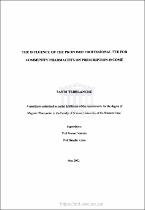| dc.contributor.advisor | Valodia, Praneet | |
| dc.contributor.author | Terblanche, Sanri | |
| dc.date.accessioned | 2023-02-06T07:00:13Z | |
| dc.date.available | 2023-02-06T07:00:13Z | |
| dc.date.issued | 2002 | |
| dc.identifier.uri | http://hdl.handle.net/11394/9545 | |
| dc.description | Magister Pharmaceuticae - MPharm | en_US |
| dc.description.abstract | prescription pricing in community pharmacies in South Africa involves a percentage mark-up on the cost of the product, followed by a varying discount to either the client or the medical scheme. The Pharmaceutical Society of South Africa (PSSA) has developed a new remuneration system for the community pharmacist whereby the price the client pays consists of the reimbursement cost of the product plus a professional fee. It was expected that the system would be implemented during 2002. An independent assessment of the development and validation of the professional fee was necessary. No standard operating procedure to apply the professional fee to a data set of
prescriptions and comparing it to the current pricing method existed' There was uncertainty on how the prescription income of community pharmacies would be affected by the professional fee. The aim of the study was to explore the influence of the proposed professional fee for community pharmacists on prescription income.' The study was conducted to (l) assess the development and validation of the professional
fee by PSSA and (2) develop a standard operating procedure to apply the proposed professional fee on a data set of prescriptions derived from community pharmacies. Three different sized pharmacies were conveniently selected. Claimed and private prescription information of six months was obtained. The data was used to determine the income using the mark-up pricing method. To determine the income using the
professional fee pricing method, a formula was developed to calculate the cost price from the gross price of each item. The proposed professional fee of R28.39 (including VAT) was added to schedule 3-7 items and a 30% mark-up was added to schedule 0-2 items. The difference in income between the two pricing methods was calculated. The incidence of overpricing and a cost neutral professional fee was calculated. A cost neutral professional fee was the value of the fee when there was no difference in income between the two pricing methods. | en_US |
| dc.language.iso | en | en_US |
| dc.publisher | University of the Western Cape | en_US |
| dc.subject | Professional fee | en_US |
| dc.subject | Pharmacists | en_US |
| dc.subject | Community pharmacies | en_US |
| dc.subject | Prescription pricing methods | en_US |
| dc.subject | Prescription income | en_US |
| dc.subject | Mark-up method | en_US |
| dc.subject | Pharmaceutical Society of South Africa (PSSA) | en_US |
| dc.subject | South Africa | en_US |
| dc.subject | Private health care sector | en_US |
| dc.subject | National Drug Policy | en_US |
| dc.title | The influence of the proposed professional fee for community pharmacists on prescription income | en_US |
| dc.rights.holder | University of the Western Cape | en_US |

